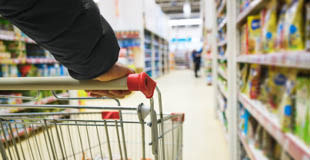Subsidiaries of TJX
- HomeGoods
- Homesense
- Marshalls
- Sierra
- T.J. Maxx
- Winners
Key Findings
- In December 2020, TJX (the parent company of companies including T.J. Maxx, Marshalls, and HomeGoods) announced it was developing a safer chemicals policy to limit chemicals of concern in certain products and its operations. The company plans to publish the policy in late 2021.
- TJX also reported plans to move to phenol-free register receipts in all U.S. retail brands in 2021, switch to PFAS-free compostable food-service ware in its U.S. corporate office cafeterias, and is working on removing polyvinyl chloride (PVC) from certain packaging by 2025. Additionally, the company has joined the Green Chemistry & Commerce Council (GC3) and is drawing on the Chemical Footprint Project framework to develop its policy.
Recommendations for TJX
- TJX can make progress by finalizing and publishing the safer chemicals policy it is developing, expanding its beyond restricted substance list (BRSL) to cover the products it sells and include additional chemicals of high concern (CHCs), and setting additional public quantifiable goals with clear timelines for reducing and eliminating CHCs and/or plastics of environmental health concern (PEHCs).
- We urge the company to eliminate and safely replace any per- and polyfluoroalkyl substances (PFAS), toxic flame retardants, and phthalates that may be in the products it sells (beyond PFAS in compostable food-service ware used in its corporate cafeterias). The company should also eliminate PEHCs from its product and packaging materials. TJX should publicly disclose the alternatives used to replace CHCs or PEHCs after eliminating them.
- The company should become a signatory to the Chemical Footprint Project and pilot it with key private label suppliers.
Grade History
How does TJX compare to its competitors?
Analysis of TJX
Oversight: Established management responsibilities and incentives
Disclosure: Requires suppliers to report use of chemicals in products to retailer
Action: Reduced or eliminated chemicals of high concern (CHCs) or plastics of environmental health concern (PEHCs) within the last three years
Safer Alternatives: Evaluates safer alternatives, avoids regrettable substitutes
Transparency: Demonstrates a commitment to transparency and public disclosure
Third-party Standards: Promotes credible third-party standards for safer products
Extra Credit:
Joint Announcement: Public commitment demonstrated through joint announcement
Continuous Improvement: Shows continuous improvement by steadily expanding safer chemicals policy
Collaboration: Actively participates in collaborative process to promote safer chemicals
Impact Investment: Investing financial resources into independent research into safer alternatives and/or green chemistry solutions




